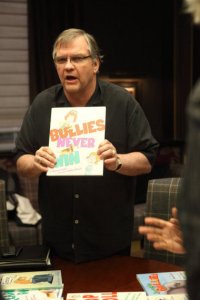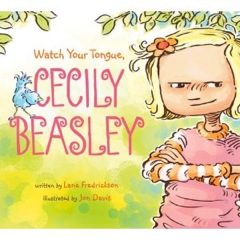I'm just ruminating over my last three poems, where I got going on a set of
Spoon,
Knife and
Fork. Atypically for me, all three are rhymed, similarly metered, and all share a basic 4-line stanza. I could keep going like this for a while, I guess, picking kitchen items and writing each its little ditty (see all the "Deeper Wisdom" poems featured at
Today's Little Ditty, of which "What Does the Knife Know?" is one).
But would that make a readable collection, a saleable collection? When I started typing this, I was planning for the answer to be "NO; that would be a little boring and samey and in a way unchallenging for both writer and reader," and then I was going to contrast that with any collection of "traditional" haiku, which would be therefore by its very nature boring and samey and unchallenging, and then I was going to wonder why haiku collections don't seem that way.
And then as I entered that second paragraph, I got walloped upside the head by
Jack on one side and
Shel on the other, and
A.A. Milne appeared to wag his clever ghostly finger in my face, reminding me how many, many classic poems and entire volumes of poetry for children are rhymed and metered and kind of about the same things (although not usually kitchen items).
Now I'm wondering what it is that makes me want a new shape, a new rhythm, a new challenge each time I begin a poem. I never cook the same recipe or meal the same way twice, and at school I'm forever devising new greetings, new center activities, new routines (and creating a lot of work for myself). While
I craved novelty as a kid, I understand that for many students, sticking with one thing for longer is what's needed for competent mastery, and that too much "new" can be stressful.
Well, it seems that in the spirit of my
OLW for 2015, I'm revising my 2nd-paragraph thinking. I still think it's important for young writers to learn that poetry is not all rhythm and rhyme, and that for most beginning writers those things are hard to pull off and probably best avoided. But golly, when 2/3 of a class of kindergarteners need to be TAUGHT to hear rhyme instead of having grown it into their bodies, and in the knowledge that I am not a beginning writer myself and quite enjoy the challenge of hewing to a rhymed and metered form, perhaps Spoon, Knife and Fork are suggesting a less varied--but no less tasty--diet of poetry for now.
Revision (with apologies to A.A. Milne)
Heidi Heidi
Mordhorst Mordhorst:
As teacher and poet she
Took great
Care to seek freedom,
Craving the novelty.
Heidi Heidi
Said to herself,
"Self," she said, said she:
"You must never get
stuck at the end of the town
called Free-Verse Poetry."
HM 2015all rights reservedToday's Little Roundup is with Paul at
These 4 Corners. Hope to see you there!

by Eric von Schmidt (Houghton Mifflin Company Boston, 1964)
Okay. It’s time for a teensy bit of name dropping. I have this cousin who is a brilliant singer and songwriter and he’s racked up a few Grammys as well. (Do you say Grammies? I don’t think so.) If you are into good, old-fashioned bluegrass and Americana, check out Jim Lauderdale. Musicians are such great storytellers, don’t you think? Sometimes I wonder if I can pack the same amount of heart and soul into a 500-word picture book that he can in a 3-minute song.
That’s partly why I was so drawn to this book, The Young Man Who Wouldn’t Hoe Corn. And that was even before I realized that there were all kinds of connections to song. That title begs to be picked and strummed, right?

I purchased this book a while back from Elwood and Eloise on Etsy. The owner, Mallory, also runs an excellent illustration blog, My Vintage Book Collection (in blog form), which is an incredible archive of gorgeous out of print materials. Thank goodness she sells some of her collection, cause I’ve added some sparkle to my own thanks to her shop. (Also, the images in this post are courtesy of her post here.)
This is the story of Jeremy Sneeze. Where he fails as a farmer he succeeds at making children laugh. (Which is to say by wiggling his ears.) He replaces fallen birds nests and makes pictures and poems. And so, of course, the elders of his town denounce his slack and shifless ways. A town meeting. A crow. A spell is cast. A sneeze. A surprise.


This book’s design is reminiscent of a song. Here’s what I mean. That color—washes of analogous color in oranges and yellows and greens, those are the harmonies to the stark black’s melody. It’s steady and rhythmic like the downbeats of an upright bass. Unless they are splashed and chaotic like a mandolin’s intricacies.


On top of stellar bookmaking, the story itself is a sweeping epic wrapped up in the short pages of a picture book. Listen to some of its lines:
Just about then he would get to puzzling about other things like “How high is up?” or “Who plants the dandelions?” or “Where do the stars go during the day?”
And every year all Jeremy had to offer was a big weedy field filled with assorted brambles and unchopped briars, bounded by dirty broken boulders.
Flap-flap, past bats that watched with eyes like razors, past lizards, toads, and laughing spiders, down past rats and rattlesnakes and monkeys dreaming evil dreams of moons.
We have specials today on stars that dance or boiling oceans, and a bargain rate for setting mountains into motion.
He hurled himself at the brambles and flung himself at the weeds with such speed you couldn’t tell which was hoe and which was crow.
True enough he is a sorry farmer. But in his head dwell pictures and in his heart are poems.

The listen-ability, the meter, the storytelling grumble. It’s all here. What a gem.
P.S.—A bit of poking around online still left me slightly confused about the history of this book and the similar-ly titled song. Did the book inspire the song? Did the song know about the book? I think the song inspired the nitty-gritty backstory of the young man who wouldn’t hoe corn. I can’t really tell, so I’ll just be sitting here enjoying both. Hope you are too.

 OK, silly title. And if anyone under 30 reads this post, they’re not gonna get the reference to Moon River.
OK, silly title. And if anyone under 30 reads this post, they’re not gonna get the reference to Moon River.
But heck, I like it, so off we go…
Many kidlit writers hear “don’t rhyme” from picture book editors. It’s not that editors hate rhyme (well, maybe SOME do), it’s just that they see badly-executed rhyme so often in the slush, it’s easier to discourage it. Common rhymes like “me, see” and “you, two” and other one-syllable predictability can kill the joy of a story.
 Remember “Celebrity Apprentice” when the men’s team gleefully authored “I know my A, B, C’s and my 1, 2, 3′s” as if it hadn’t been regurgitated in a googolplex of board books? They thought it was a rhyme worthy of victory and publication. Well, they did win the challenge, but the book Trump promised to publish was released by a vanity press, not a traditional publisher. No publisher was gonna touch it, ten foot pole or not.
Remember “Celebrity Apprentice” when the men’s team gleefully authored “I know my A, B, C’s and my 1, 2, 3′s” as if it hadn’t been regurgitated in a googolplex of board books? They thought it was a rhyme worthy of victory and publication. Well, they did win the challenge, but the book Trump promised to publish was released by a vanity press, not a traditional publisher. No publisher was gonna touch it, ten foot pole or not.
Editors also see a lot of rhyme with flawed meter. Meter is a tricky thing. There’s stressed and unstressed syllables, plus the lilt of natural speech patterns that can render your meter more choppy than Zoanette Johnson’s drumming. If you read your own rhyme aloud, you might not even hear how off it is, because you are forcing yourself to follow the pattern you created.
Then there’s the near-rhyme mistake, when the words don’t really rhyme at all, unless you twist your tongue or alter your accent. Like “hat” and “what” or “hat” and “back”. Once or twice and you can maybe get away with it. More than that and the editor may assume you need the WaxVac.
Moreover, writers can find their story dictated by rhyme, getting trapped in nonsensical situations simply because “dishwasher” rhymes with “impostor” (almost). It’s obvious when a plot decision has been forced based upon one word.
For these reasons, editors will advise, “don’t rhyme”.
For these reasons, author Lane Fredrickson created RhymeWeaver.com.
 Lane is the author of WATCH YOUR TONGUE, CECILY BEASLEY, a rhyming picture book with a joyfully jaunty rhyme. Remember as a child when you stuck out your tongue and a parent warned, “It will get stuck that way!” Well, Cecily finds herself in that very predicament. Hilarity ensues when a bird takes up residence on Cecily’s perfect pink perch. What’s Cecily to do?
Lane is the author of WATCH YOUR TONGUE, CECILY BEASLEY, a rhyming picture book with a joyfully jaunty rhyme. Remember as a child when you stuck out your tongue and a parent warned, “It will get stuck that way!” Well, Cecily finds herself in that very predicament. Hilarity ensues when a bird takes up residence on Cecily’s perfect pink perch. What’s Cecily to do?
Knowing the difficulty of rhyme for picture book writers, Lane created RhymeWeaver.com to teach the bard-challenged the complexities of rhyming well.
Lane, your rhyme is perfection! How did you get to be so good at it?
Ha. Thank you, Tara.
The short answer would be: a gnawing question and a genetic glitch.
But there is also the long answer. When I first joined SCBWI, everybody seemed to be telling everyone else NOT to write in rhyme, like there was a disease associated with it. You know, literary sarcoma or writer’s blockjaw. You almost didn’t want to admit you were a rhymer lest they sit in some quarantined section and slap a scarlet R on your forehead. The other thing I kept hearing was that a person’s rhyme had to be PERFECT. I wanted to write PERFECT rhyme, but I could never get a really good answer as to what PERFECT rhyme was. This is the kind of scenario that drives a slightly obsessive-compulsive person to behaving obsessively compulsive. So I googled around and studied my Seuss and found a website that offered critiques for $50. The critique, although well-intentioned, was just plain bad advice involving “counting syllables.” And don’t get me wrong, I’ve definitely given bad advice (but I’m pretty sure it was free when I did it). I totally get that sometimes bad advice seems good because it comes from multiple sources, but “counting syllables” is not the way to perfect meter and I had (being slightly obsessive compulsive) already figured that out. So I went back to school thinking I’d take a poetry class and clear up the PERFECT meter issue. But the thing about college is they don’t tell you what you want to know, they tell you whatever they want to tell you. So it took a BA in English and healthy stab at an MA in British Lit to figure it out that meter is a lot of things, but PERFECT is rarely one of them (I only stabbed at the MA, I haven’ t killed it yet).
 What inspired you to put all your rhyming knowledge into a website?
What inspired you to put all your rhyming knowledge into a website?
I watched a lot of people go through exactly what I went through: trying to figure out the rules, trying to decide if writing in rhyme was worth the stigma, trying to find complete resources that explained everything. I have a degree in psychology, where I focused on cognition and development (which is the opposite of those people who ask you to talk about your problems). Cognitive and developmental psychologists look at how people think and how they grow, mature, and learn. I knew that I could show meter in a way that’s visual and image-based. I knew that I could break it down into constituent parts in a way that I had never seen done. I knew that I could make it easier to grasp. But I wanted it to be free because I’m trying to improve the status of rhyme in the literary world and the more people who rhyme well, the less it looks like I have a disease.
Lane’s website has already helped this ruined rhymer who can’t hear meter even if I got whacked upside the head with it. So I encourage you to pay RhymeWeaver.com a visit, Pin it, share it, study it, LIVE IT. Children deserve better rhyming picture books like CECILY BEASLEY.
And hey, you can WIN CECILY! Just leave a comment telling me about the most interesting thing you learned at RhymeWeaver.com. A winner will be picked randomly in a week (or knowing me and prize distribution, two weeks).
So don’t hesitate, get out there and rhyme, oh Kate! (Sorry if your name isn’t Kate. I had to end on a rhyme.)



Cartoon for the Dutch Nu.nl news website, about a decrease of the profit for oil concern Shell, due to a lower oil price.
More at Sevensheaven.nl
I am reading a new book by Catherine Jinks at present – a young adult title called Living Hell. I’m enjoying it, though the subject matter makes me squirm a little. The characters (possibly the last surviving humans) are on a spaceship which has just become a living being. They are busily trying to avoid being digested or attacked by anti-bodies.
Jinks is an author whose work I greatly admire.












 Remember “
Remember “
 What inspired you to put all your rhyming knowledge into a website?
What inspired you to put all your rhyming knowledge into a website?
Thank you, Laurie. Great link.